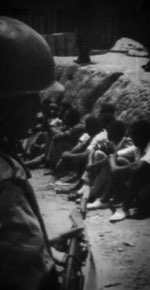Encounters with conflict and peace
Playing with fire: cheap tricks
In the years before the genocide, there was a stream of hostile anti-Tutsi propaganda from politicians, university professors and media personalities.
"It is the intellectuals who emancipated them, by planting the idea of genocide in their heads and sweeping away their hesitations.” Innocent Rwililiza, a survivor

In 1991, while the attacking Tutsi rebels were gaining ground, speeches at Rwandan political meetings, notably at rallies held by the party of President Habyarimana and his ministers, consisted almost entirely of threats made against Tutsis.
In Butare, home of the national university, professors vied with one another to publish historical screeds and anti-Tutsi diatribes. In the broadcast studios of popular radio stations, Radio Rwanda and Radio Mille Collines, the Tutsis were referred to as “cockroaches”. Announcers, the two best known of whom were Simon Bikindi and Kantano Habimana, used humorous sketches and songs to call openly for the destruction of the Tutsis."
From A time for machetes: the killers speak
The stated targets of the hatred were the Tutsi rebels, but the implication was clear: no Tutsi was to be trusted. By this stage there were very few Tutsi in positions of authority - only two members of parliament, one town mayor and almost none in the army or police force. “To even vaguely imply that they were still a privileged elite was plainly ludicrous.” (Fergal Keane)
But to ordinary people with long memories of Tutsi rule, the propaganda had a powerful effect…
But to ordinary people with long memories of Tutsi rule, the propaganda had a powerful effect…
"Infected by an anti-Tutsi psychosis"

Tens of thousands became infected - and I can think of no other word that can describe the condition - by an anti-Tutsi psychosis; they were convinced through newspapers, radio and the frequent public speeches of Habyarimana's closest supporters that the Tutsis were going to turn them into beasts of the field once again.
The Hutu extremists, most of them members or supporters of the ruling party, produced a set of Ten Commandments that dictated how Hutus should treat their Tutsi neighbours. Among other things it described as 'traitors' any Hutus who married, befriended or employed Tutsis; all Tutsis were dishonest and, they were to be excluded from business and from positions of influence in education; crucially the Commandments - given wide circulation in Rwanda - urged Hutus to 'stop having mercy on the Batutsi'. This last injunction was to be obeyed by thousands of Hutu peasants when the genocide began.
The theology of hate espoused by the extremists was remarkably similar to that of the Nazis in their campaign against the Jews prior to the outbreak of the Second World War. It was designed to marginalise the Tutsis and create an atmosphere in which- their mass destruction would be acceptable, almost inevitable.
From Season of Blood. A Rwandan Journey
Why did those sparks light such a fire?
I can think of several reasons. First, Rwanda, especially back then, was a strongly hierarchical society. If a person in authority told you something, you were more likely to believe it and act on it that in some other cultures.
Second, the speeches and the jokes were tapping into real beliefs shared by many Rwandans. “They were harnessing real social forces, embedded in the structure of the society and in the perceptions of many of its members” (Peter Uvin)
Third, sometimes the propaganda was very funny.

“Those gentlemen were famous artists, great comic virtuosos. What they said was so cleverly put, and repeated so often, that we Tutsis as well, we found them funny to listen to. They were clamouring for the massacre of all the cockroaches, but in amusing ways.
For us, the Tutsis, those witty words were hilarious. The songs urging the Hutus to get together to wipe out the Tutsis – we laughed out loud at the jokes. Same thing for The Hutu Ten Commandments, which vowed to do us in. We got so used to these things that we didn’t listen to the horrible threats anymore”
In that atmosphere, what was it like to be an ordinary Tutsi in a Rwandan village?
< previous page | next page >
In this section
A HISTORY OF CONFLICT
Real differences
Hutu and Tutsi
A history of conflict
THE POLITICS OF RACISM
Colonialism
A messy power shift
Refugees and scapegoating
Cheap tricks
Preparing for genocide
INSIGHTS
Pressures
In the villages
STORIES
My friend the killer

Real differences
Hutu and Tutsi
A history of conflict
THE POLITICS OF RACISM
Colonialism
A messy power shift
Refugees and scapegoating
Cheap tricks
Preparing for genocide
INSIGHTS
Pressures
In the villages
STORIES
My friend the killer

